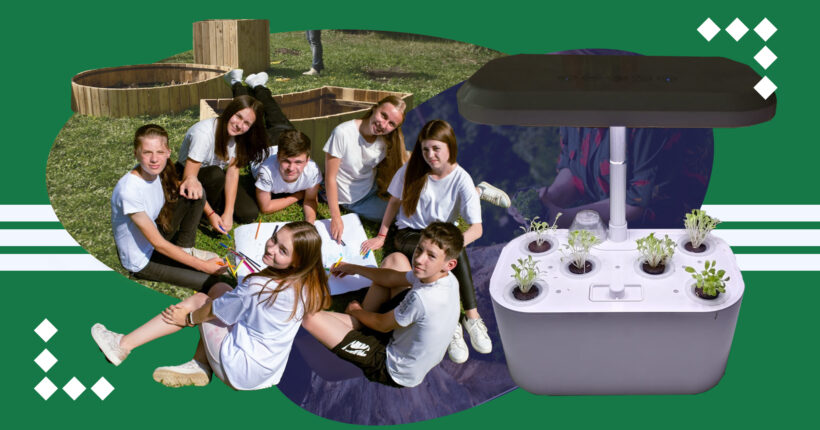
How it all started?
Beds on the windowsill and tasty breaks
The idea of growing their own products arose a few years ago. It all started with small beds on the windowsill, which were looked after by teachers and students. Gradually, the school began to organize flash mobs with tasty breaks, where children prepared sandwiches with grown greens.
"The children observed how the greens gradually grew, harvested, and tasted them — the taste of what you have grown on your own is much better," shares Iryna Dymiy, the coordinator of the project "Organic products for school. The first step" and history teacher of the school.

Devices for growing plants. Photo: Iryna Dymiy
The entire school team supported the initiative. The deputy director proposed to increase the scale of cultivation to a garden, which would provide food for the cafeteria. For this, they decided to involve the school premises, which occupy more than a hectare of land.
The deputy director has been serving in the ranks of the Armed Forces of Ukraine for over a year, and the school decided to implement his dream and make hydroponic beds inside the school.
What is the problem?
"It didn't work out very well without the help of professionals"
Although the students and teachers already had the experience of growing products on the windowsills, it was not an easy task to arrange the school territory for a garden — they had to choose the right fertile area, arrange the beds, and also find financing for the purchase of materials and seedlings.
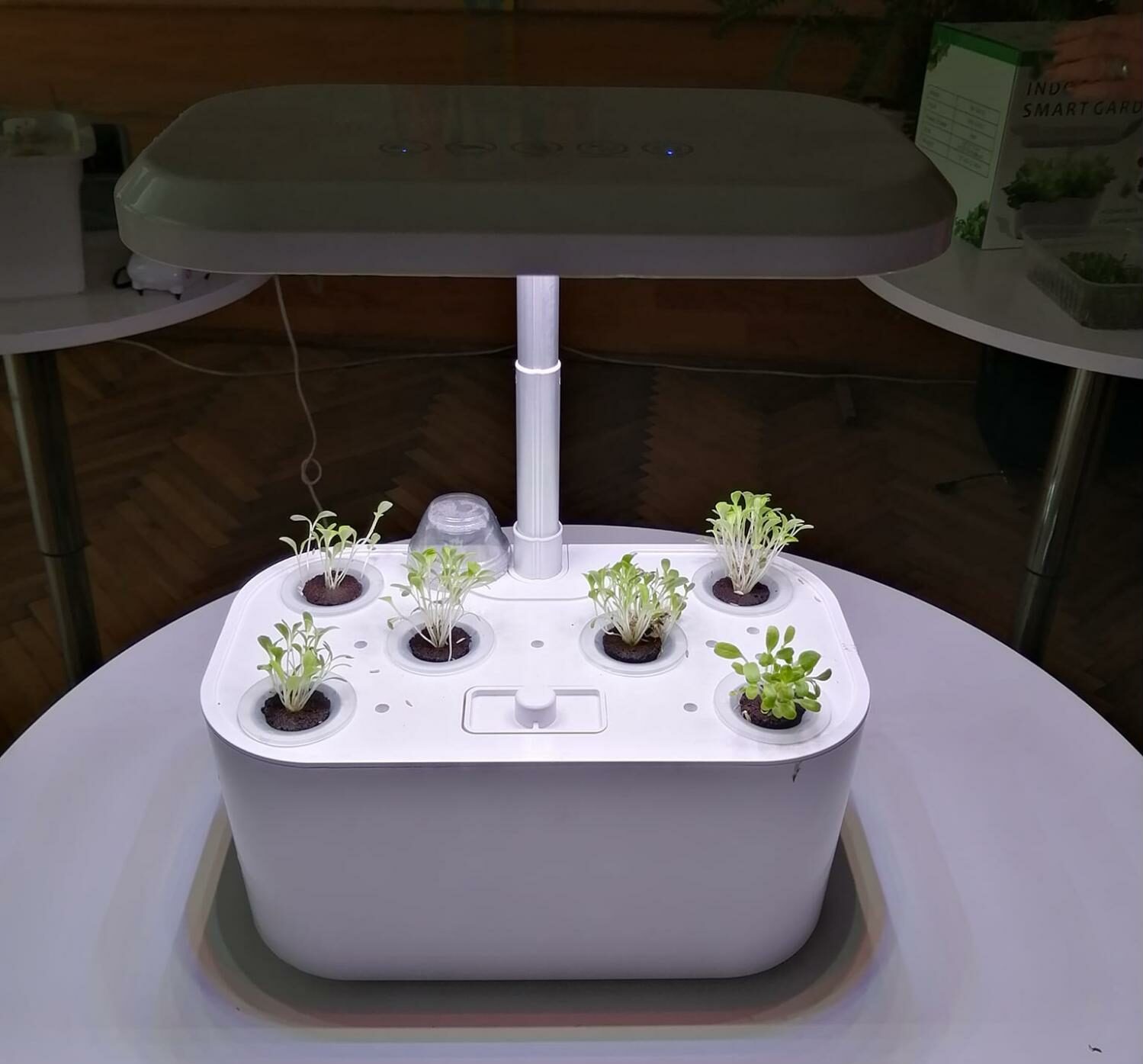
A device for cultivation. Photo: Iryna Dymiy
At the end of 2021, the Rudky School joined the Yaryna School Green project, within which they planned to raise funds and purchase hydroponic devices for cultivation. However, due to Russia's invasion, it was not possible to fully realize the dream. The lack of the necessary knowledge of ecology, carpentry, design, crowdfunding, financing, and equipment complicated the situation, making it impossible to scale the project.
What is the solution?
Support of mentors and continuous training
In the spring of 2023, the Rudky school joined the Plan.DIY educational program on reconstruction for teenagers. Within its boundaries, a team of three teachers and six high school students, led by the school's principal, received mentors who helped design and arrange flower beds and collect the necessary funds for materials and seedlings.

A team of teachers and students. Screenshot from the network
According to Dymiy, before making flower beds, teachers and students had to attend more than one online meeting, where they jointly developed a garden project, drew up an action plan, and distributed responsibilities. Three workshops were also organized for the school, thanks to which the first beds were made, installed, and planted.
At the first workshop, teachers and students developed ideas, inspected and measured the territory, and created a digital project of the garden plot.
"The area where we planned to plant a garden turned out to be unsuitable. Since construction waste was left there after the construction of the school, the soil is not very fertile," explains Dymiy.

Pupils measure the area for the future garden. Photo from open sources
The following two workshops were already devoted to producing beds and benches for recreation areas. To do this, makers from Tolocar and WokaWoka came to the school and taught teachers and students how to work with wood and metal: saw, grind, process beams, drill, connect, and cover the finished beds with special tools and oil. Special tools were also purchased for the student workshop as part of the program. Thanks to them, the team continues to create beds and benches independently.
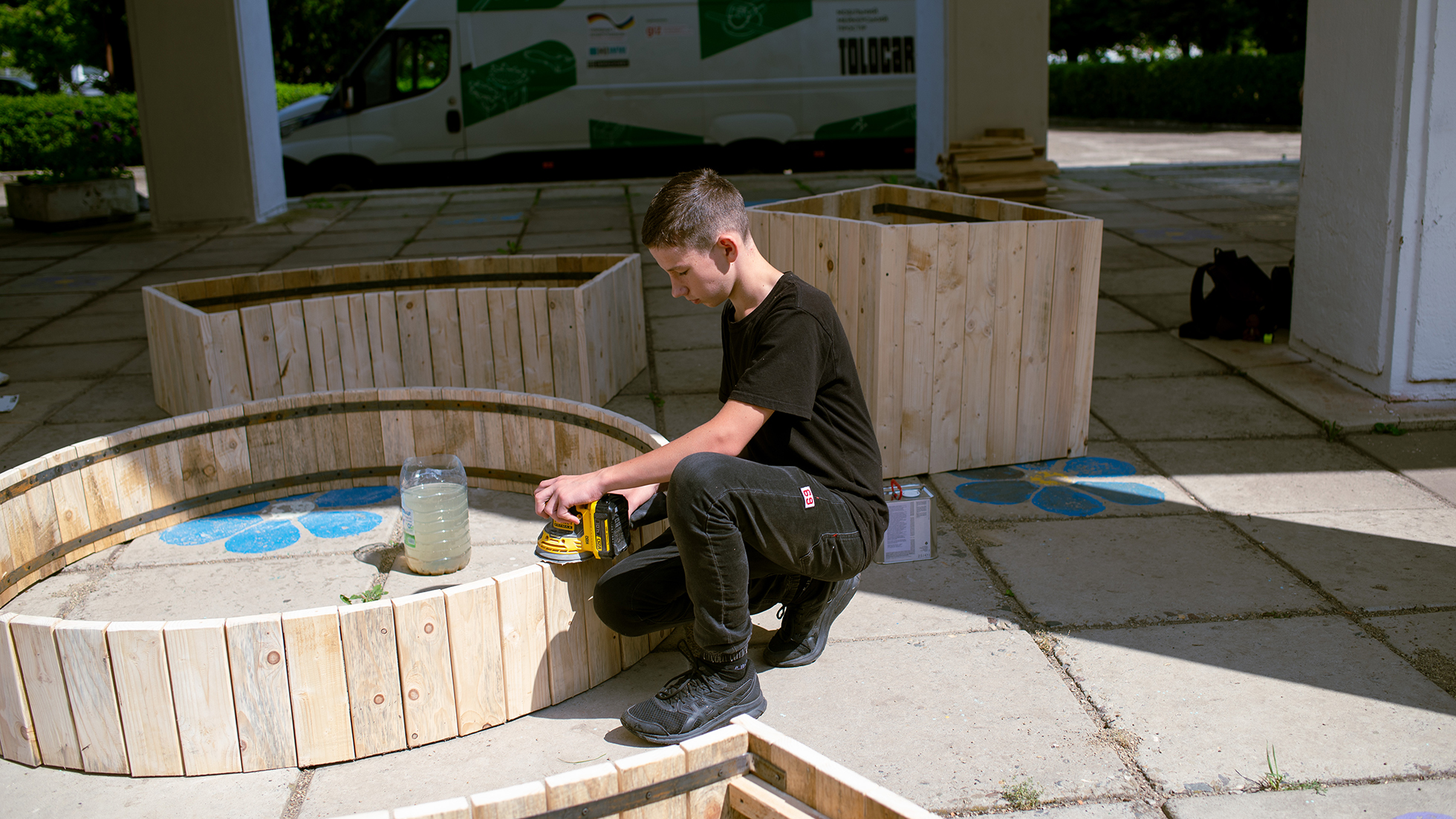
A student polishes ready-made flower beds in the schoolyard. Photo: Iryna Dymiy
The students also remembered the classes on design thinking and the master class by Bohdan Velgan, the facilitator and co-founder of Insha Osvita. Using the example of the game Life as a Project, they learned to plan their time. This allowed high school students to be sufficiently involved in organizing the garden without harming their studies and preparation for final exams.
"We are very grateful to the Plan.Diy program, within the framework of which we were selected mentors with the necessary specialization for our project and garden because we lacked this professional training and knowledge in related fields," says Dymiy. The Rudky school team, together with mentors. Photo: Iryna Dymiy
The Rudky school team, together with mentors. Photo: Iryna Dymiy
How does it work?
Since the school grounds cover one hectare, the team decided to choose five ares for the garden arrangement. Five beds have already been installed and planted with greens and spicy crops recommended for the school menu by chef Yevhen Klopotenko.
"We have already planted sage, thyme, rosemary, lavender, lovage, mint, lemon balm, marjoram. Soon, the meals in our dining room will be replenished with all these grown spices," notes Dymiy.
They decided to equip the plot with a real multi-functional eco-space. Benches for study areas and places of solitude will soon be installed next to the flower beds. A separate area is set aside for composters, where food and natural waste are turned into organic fertilizer.

The project of an eco-space with a garden in the center. Photo from open sources
During the planning process, the team decided to create reading zones and provided for the presence of trees that would create shade.

Pupils read books on the territory of the eco-space. Photo from open sources
Although active work on arranging and caring for the garden was done in the summer, it also constantly requires attention, watering, weeding, and trimming during the rest of the seasons. Therefore, students and teachers, if necessary, perform the required work as part of their educational process — during a break or allocate some time after classes.
"We are not yet doing separate classes for garden care because there simply won't be enough time," explains the coordinator.

A team of students. Photo: Iryna Dymiy
With the development of the garden, more and more people are willing to participate in its arrangement. In particular, the last workshop in December was attended by 24 people — three times more than the starting team. Parents also played a significant role in this, supporting children and allowing them to participate in making beds and taking care of them.
So that everyone willing could help care for the flower beds, the team decided to make them inclusive. The height between the beds is different — there are higher and lower ones. In this way, students of various ages and adults, as well as those who move around in a wheelchair, will be able to take care of them.
The high beds also helped protect the harvest from chickens that sometimes come from the neighboring private households.

Beds in the garden. Photo from open sources
"No one guaranteed us results"
During the garden arrangement, students and teachers faced various challenges and problems. Fundraising was a stressful stage for the team, as the total amount for creating an eco-space with a garden was ₴105,415, of which ₴69,624 were collected on the crowdfunding platform Spilnokosht.
"It was terrifying when we started collecting funds. This was one of the largest sums among the Plan.Diy projects. Rudky is still a small town, so we were a little discouraged in our abilities, but when I saw that we were receiving quite a lot of money, I understood that we were on to something," the student recalls.
During the fund-raising, in fact, for a whole month, the mornings of the teams began with checking Spilnokosht, the coordinator recalls. The students were very anxious to collect the necessary amount in time and were very nervous when it did not change for several days. Teachers and parents tried to support them in such moments as much as possible. At the same time, the children did not waste time, looked for help among acquaintances, and turned to influencers on social networks.
The team collected ₴70,000 at Spilnokosht, and ₴35,000 were received as part of the program.

Seedlings for the garden. Photo from open sources
The team was also worried about the planted plants since no one guaranteed their harvest and successful growth. The hot summer complicated the situation, and the beds had to be watered often. However, almost all plants in the garden grew, although some died.

Watering the beds in a tree stump. Photo from open sources
It was impossible to save the decorative plants planted in the old tree stump that remained in the eco-space area from the 40-year-old willow. However, they plan to decorate the stump again this spring and plant something new in it.
"No one guaranteed us results. The program provides training and support from mentors, but this does not mean that everything will grow and be perfect. We understood that we had to speak, work, and bring the started matter to the end," the coordinator notes.
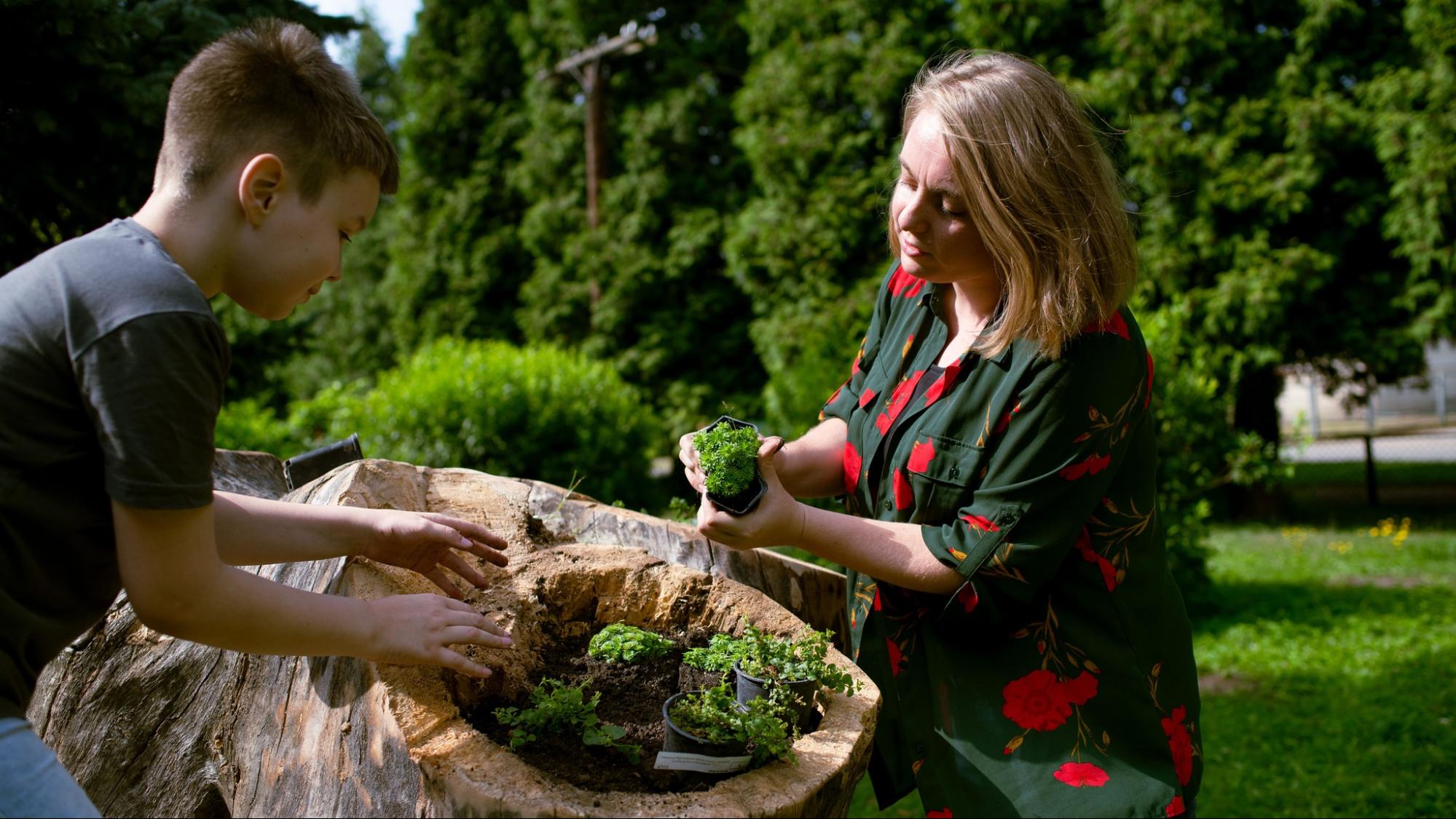
Arrangement of beds in tree stump. Photo from the network
Environmental awareness and food safety
The vegetable garden created near the school aims not only to supply the canteen and diversify its menu but also to achieve somewhat deeper goals — to shorten the path of products and accustom children to a healthy diet and lifestyle. Therefore, all processes are designed in such a way as to save the planet's resources and recycle waste.
"Our basic ecological component is that we want to close the production within the limits of our eco-space. We process the rest in composters and use the resulting organic fertilizer for plants. We also shorten the path of products to the table, which positively affects the environment because there are no energy costs for transportation and storage. Everything ends up in the dining room from our garden at once," explains the coordinator.
The team is convinced that other schools will be able to adopt their experience. You can start cultivation from the same beds on the windowsill, gradually learning and increasing the scale. Students will learn how to grow organic produce without using massive resources. In addition, they will learn to arrange their space stylishly and ecologically and also start healthy eating habits. In the future, this experience will be helpful for children and parents in their own lives.
"Such a project as a garden will help strengthen food security. Considering that there is a war in Ukraine, the skill of growing food will not hurt anyone. Now is the time for reconstruction, and we have chosen the path of construction. Our garden is something new, and we created it for the sake of the future," shares Dymiy.
Does it really work?
First harvests and plans for the future
Although the garden was planted only in the summer, the students collected their first abundant harvest of mint and lemon balm already in the fall. One part of it was transferred to the cafeteria for tea, and the other part was dried and given to the soldiers at the front. Other planted spices were not cut and were left to overwinter under a protective layer of pine needles.
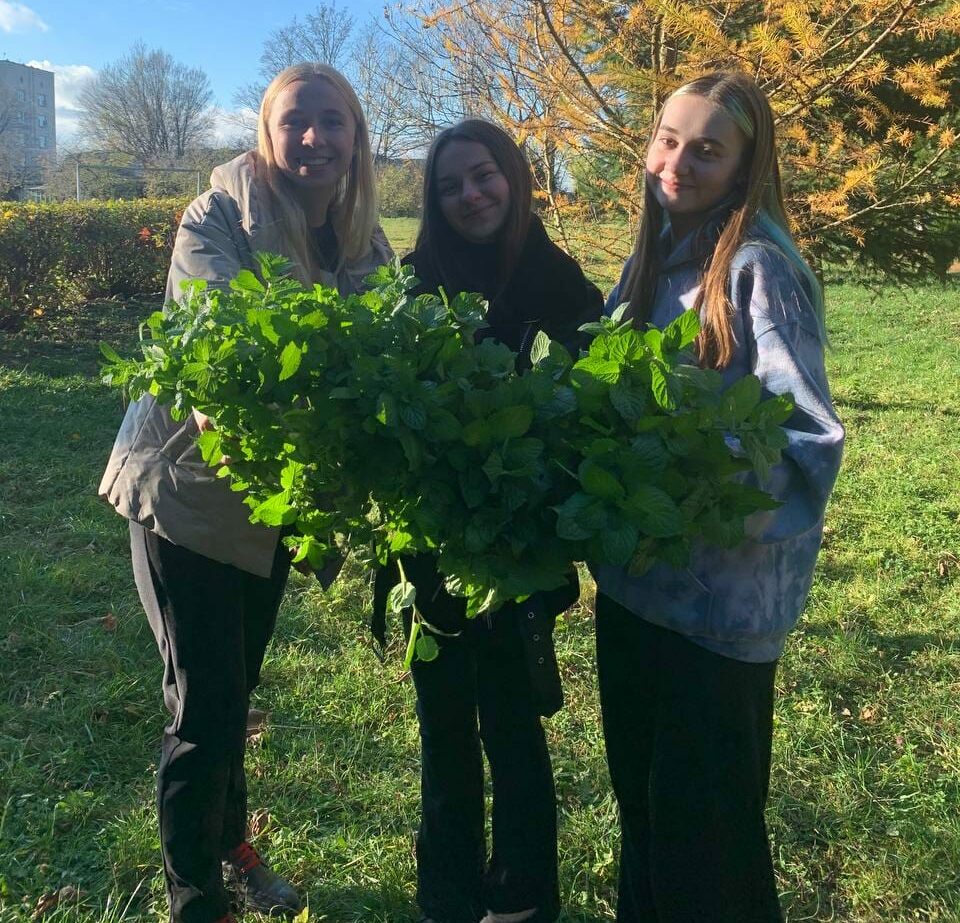
Students with a harvest of mint and lemon balm.
During the winter, a team of students and teachers independently continued the production of benches and flower beds for their eco-space. Much work is ahead — the installation and de-conservation of the planted plants.
The garden arrangement brought together teachers and students who were on the same level, studying and making beds together. During this time, they became a real team, where everyone listened and learned from each other. Even though the students had a bunch of new tasks and responsibilities, they quickly overcame all difficulties. Therefore, the teachers are convinced that fruit, berry, and vegetable crops will soon appear in the garden, which will supply the school canteen and the entire Rudky community.
Newsletter
Digest of the most interesting news: just about the main thing







